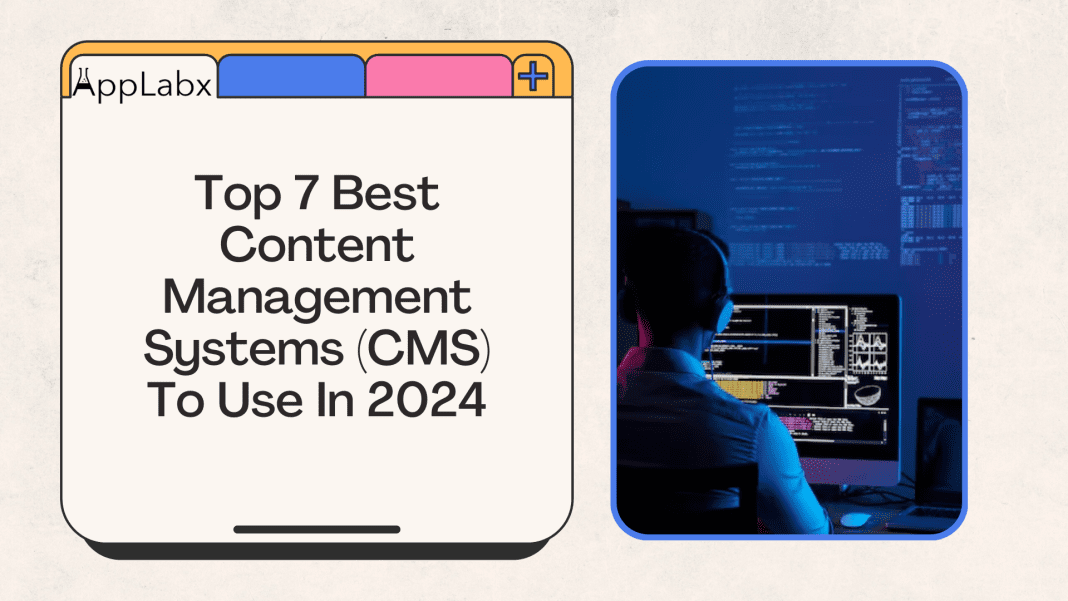Key Takeaways
- Revolutionize Your Website: Unlock digital success with WordPress, the epitome of versatility in our top CMS choices for 2024, catering to bloggers, developers, and beyond.
- Elevate Your E-commerce Game: Empower your e-commerce journey with Adobe Commerce and PrestaShop, the dynamic duo leading the pack in 2024 for scalable, flexible, and robust online solutions.
- Transform Enterprise Strategy: Transform your enterprise strategy with Sitecore’s advanced capabilities and redefine marketing efficiency with HubSpot CMS – the key players shaping 2024’s digital frontier.
Empower your online journey with the top 7 CMS options for 2024, from the unmatched versatility of WordPress to the enterprise-level excellence of Sitecore.
Uncover the best-suited CMS for your needs in 2024 – whether you’re a blogger, e-commerce enthusiast, or enterprise, our top 7 recommendations guide your digital success.
Stay ahead in 2024’s digital landscape with insights into the leading CMS options.

From user-friendly WordPress to enterprise powerhouse Sitecore, make informed choices for a thriving online presence.
In an era where the digital landscape is more dynamic than ever, the choice of a Content Management System (CMS) transcends mere website management—it becomes a strategic cornerstone for online success.
As we stand on the cusp of 2024, the array of CMS options available is vast and transformative.
This blog seeks to be your guiding light through this ever-evolving digital labyrinth, unveiling the “Top 7 Best Content Management Systems to Use in 2024.”
Whether you’re a seasoned developer, an aspiring blogger, or an entrepreneur venturing into e-commerce, the selection of the right CMS is paramount for a successful online journey.
The Unveiling of Top 7 CMS for 2024
As we unveil the “Top 7 Best Content Management Systems to Use in 2024,” our journey commences with WordPress, the reigning giant in the CMS market.
We will dissect its dominance, explore the new features, and unravel the SEO plugins that make it a perennial favourite.
Joomla, heralded for its robust and flexible nature, steps into the spotlight, showcasing noteworthy features for the year and insights into optimizing SEO.
In essence, this blog is not just a guide.
It’s a beacon of knowledge, navigating you through the intricate web of CMS options, shedding light on the nuances that often go unnoticed, and empowering you to sculpt a digital presence that not only meets but exceeds the expectations of 2024.
So, buckle up as we embark on this expedition through the “Top 7 Best Content Management Systems to Use in 2024,” where the intersection of technology, creativity, and SEO prowess awaits your discovery.
But, before we venture further, we like to share who we are and what we do.
About AppLabx
From developing a solid marketing plan to creating compelling content, optimizing for search engines, leveraging social media, and utilizing paid advertising, AppLabx offers a comprehensive suite of digital marketing services designed to drive growth and profitability for your business.
AppLabx is well known for helping companies and startups use website marketing to drive web traffic to their websites and web apps.
At AppLabx, we understand that no two businesses are alike. That’s why we take a personalized approach to every project, working closely with our clients to understand their unique needs and goals, and developing customized strategies to help them achieve success.
If you need a digital consultation, then send in an inquiry here.
Top 7 Best Content Management Systems (CMS) To Use In 2024
1. WordPress

In February 2021, the WordPress software now powers 40% of the top 10 million websites in the world, solidifying its status as the most widely adopted platform.
This open-source software, renowned for its unparalleled flexibility and scalability, has etched its mark on the digital landscape.
Advantages
- Flexible Cost Structure: Tailored to individual needs and budgets, WordPress offers a cost structure that adapts seamlessly to varying requirements.
- Customization Prowess: With a vast collection of free themes and powerful plugins, users can personalize their websites extensively.
Disadvantages
- Quality Concerns: Despite the vast array of plugins and themes, not all are reliable or of high quality, necessitating discernment in selection.
- Customer Support Limitations: WordPress lacks personalized customer support, relying predominantly on forums, tutorials, and documentation for issue resolution.
Ideal for
WordPress caters to users across the spectrum, from those embarking on a simple blog to individuals undertaking the creation of complex websites.
A prime illustration of WordPress’s versatility is exemplified by Sony Music, which utilizes the platform to showcase images and videos of its featured artists.
Key Features
- WordPress facilitates seamless user management, allowing the assignment of roles and access to different user types, including administrators, editors, authors, contributors, and subscribers.
- Enhancing SEO practices, WordPress incorporates features such as alt text and captions when inserting images.
- Visitors can actively engage with content through built-in comments, fostering interaction on pages and posts.
In essence, WordPress emerges not merely as a CMS but as a digital powerhouse, offering unparalleled adaptability and a feature-rich environment.
As we delve into its intricacies, it becomes apparent that WordPress is not just a tool; it’s an ecosystem that caters to the diverse needs of web developers and content creators alike.
2. Joomla
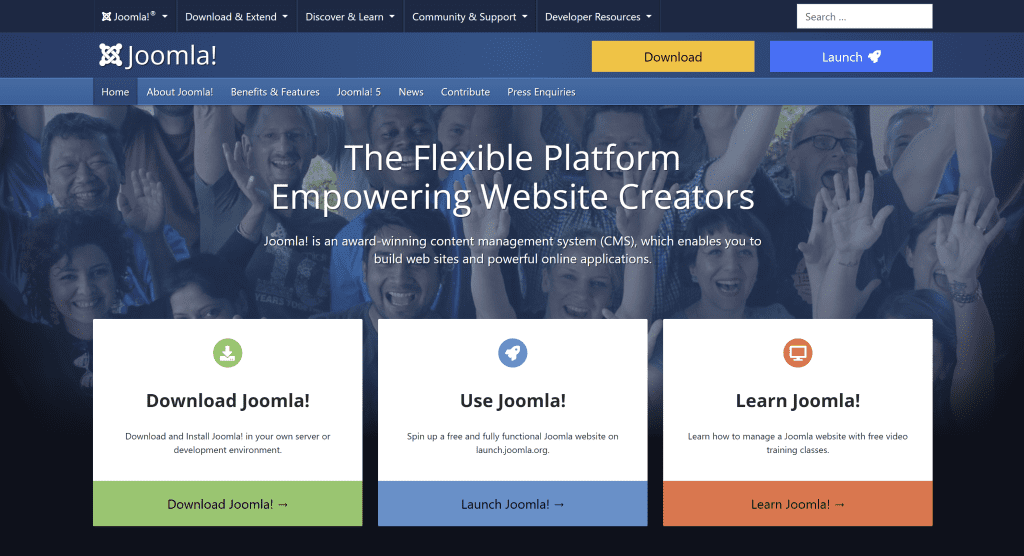
The CMS system Joomla stands tall as an open-source Content Management System (CMS) renowned for its inherent capabilities.
Distinguished from other CMS platforms, Joomla’s core software boasts immediate functionality, with a special emphasis on its advanced multilingual features. However, the initial setup of Joomla can pose a challenge, particularly for users without technical expertise.
Advantages
- Efficient Site Management: Joomla excels in efficiently managing websites with extensive sub-pages, making it an ideal choice for complex online ecosystems.
- Enhanced Security Measures: Implementing 2-factor authentication adds an extra layer of security, fortifying the website against potential breaches.
Disadvantages
- Complex Control Panel Terminology: Non-technical users may find the web development terminology featured in the control panel less beginner-friendly, potentially posing a hurdle in the initial stages.
- Compatibility Challenges: Joomla faces issues of compatibility between different modules, extensions, and plugins, necessitating careful consideration during customization.
Ideal for
Joomla emerges as the preferred choice for professional websites managed collaboratively by multiple individuals.
A prime example is the official website of international tennis player Roger Federer, where Joomla seamlessly integrates portfolio display, a news platform, and an online shop.
Key Features
- Joomla incorporates a robust banner management tool, empowering users to create advertising campaigns and monetize their websites effectively.
- With an extensive offering of more than 70 languages available within its core software, Joomla caters to a global audience, ensuring linguistic inclusivity.
- Visitors can easily find relevant information through Joomla’s built-in search tool or smart search feature, enhancing the overall user experience.
In essence, Joomla transcends the realm of a conventional CMS, offering sophistication and versatility.
As we navigate its features, it becomes apparent that Joomla is not merely a platform but a strategic choice for those seeking advanced functionality, collaborative management, and a global reach in the digital landscape.
3. Drupal
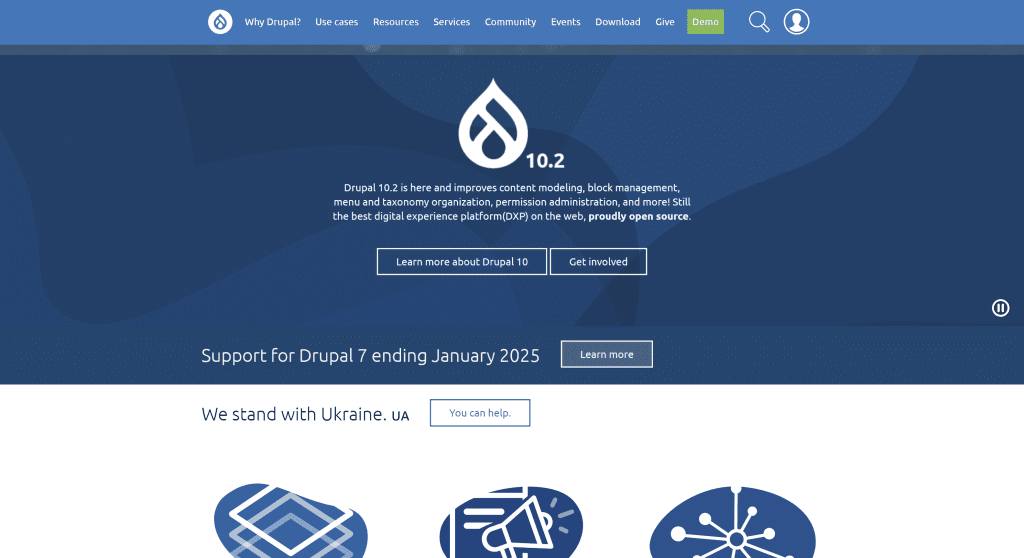
Tailored for seasoned web developers, Drupal stands as an epitome of technological sophistication with its flexible API architecture catering to diverse digital platforms.
In comparison to its counterparts, Joomla and WordPress, Drupal meticulously optimizes its built-in features, paving the way for enhanced performance and fortified security.
Notably, websites powered by Drupal consistently draw higher web traffic, underscoring its prominence in the CMS realm.
Advantages
- Robust Security Measures: Regular security tests conducted by the CMS software render Drupal less vulnerable to threats, establishing it as a stalwart in safeguarding digital assets.
- Built-in Modules for Enhanced Functionality: Drupal boasts a suite of built-in modules that seamlessly expand the functionality of websites, offering a comprehensive toolkit to developers.
Disadvantages
- Coding Prerequisites: Proficiency in coding languages such as PHP, CSS, and HTML is imperative, making Drupal more suitable for users well-versed in these domains.
- Management Complexity: Tasks like upgrading to a new version can be time-consuming, demanding a higher level of commitment and technical expertise from users.
Ideal for
Drupal emerges as the CMS of choice for advanced users possessing profound technical knowledge, particularly those seeking to create large-scale and complex websites.
A notable illustration is the official website of the City of Los Angeles, where Drupal facilitates the dissemination of updates and information about the city to its residents.
Key Features
- Drupal’s automated language translation supports over 100 languages, ensuring a global reach and linguistic inclusivity.
- Leveraging data from geolocation, browser history, device type, and behavior taxonomies, Drupal empowers users to create a highly personalized customer experience.
- Drupal facilitates the creation of automated marketing campaigns, enabling users to extend their reach and engage with their audience more effectively.
In essence, Drupal is not just a CMS; it is a testament to advanced web development, offering a platform where performance, security, and customization converge.
As we unravel its intricacies, it becomes evident that Drupal is not for the faint-hearted; rather, it is a tool embraced by those who navigate the digital realm with a mastery of coding and a vision for intricate, large-scale digital landscapes.
4. Adobe Commerce
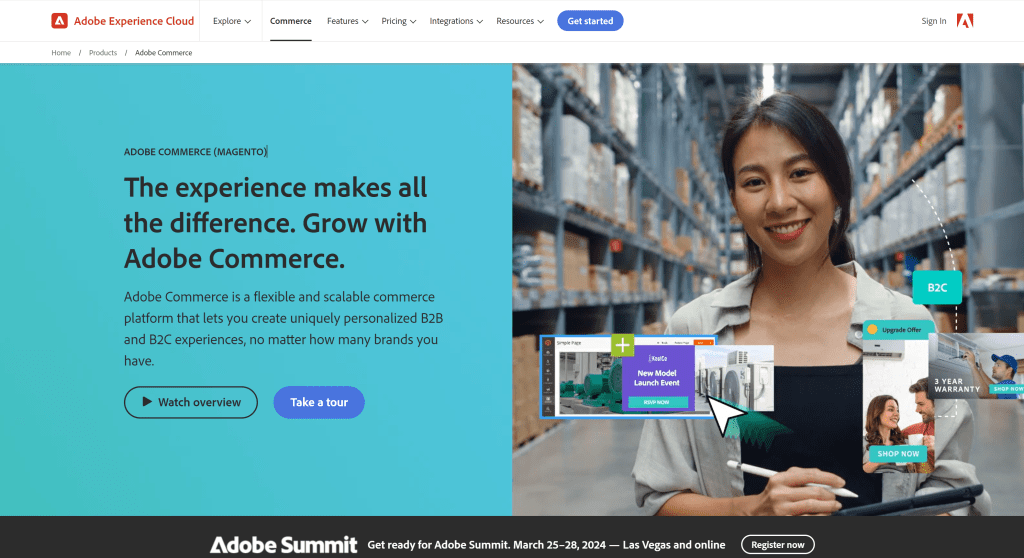
Positioned as one of the premier eCommerce platforms, Adobe Commerce stands as a beacon for online retailers seeking unparalleled sophistication.
This CMS software is meticulously crafted to prioritize security, SEO, and customization, providing a robust foundation to optimize a spectrum of eCommerce sites.
Tailored for larger online stores, Adobe Commerce’s prowess is evident in its ability to effortlessly handle an extensive array of products and orders.
Advantages
- Global Store Management: Adobe Commerce empowers users to effortlessly manage multiple stores across various locations, accommodating diverse languages and currencies to cater to a global audience.
- Responsive Content Management: The content management system seamlessly adapts to mobile devices, ensuring a consistent and user-friendly experience across diverse platforms.
Disadvantages
- Complex Initial Setup: The initial setup of Adobe Commerce can be intricate, demanding careful attention and technical expertise.
- Time-Consuming Customization: Tasks such as customizing design elements and listing products may require considerable time and effort.
Ideal for
Adobe Commerce finds its sweet spot in medium to large-scale eCommerce stores.
A stellar illustration is Olympus, a major eCommerce player specializing in cameras, audio equipment, and binoculars, showcasing the platform’s capability to cater to extensive product catalogues.
Key Features
- Adobe Commerce prioritizes security through a robust payment gateway, incorporating options such as Worldpay and Cybersource to ensure a secure checkout process.
- The back-end admin dashboard is touch-sensitive, streamlining the editing process and enhancing user convenience.
- Showcase products virtually with Adobe Commerce’s catalogue management, featuring dynamic pricing and immediate product creation to meet the dynamic demands of eCommerce.
In essence, Adobe Commerce is not merely an eCommerce platform; it is a testament to the fusion of security, customization, and scalability in the digital retail space.
As we delve into its features, it becomes apparent that Adobe Commerce caters to the discerning needs of medium to large-scale online retailers, providing a robust and feature-rich environment for those navigating the intricacies of the eCommerce landscape.
5. PrestaShop
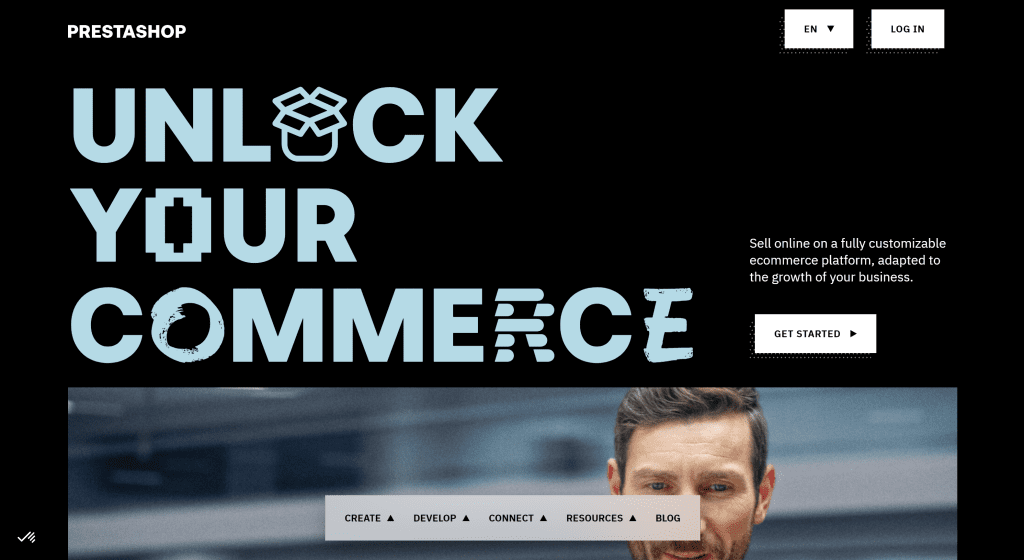
The PrestaShop emerges as a prominent CMS platform, meticulously designed to cater to the nuanced needs of small to medium-sized eCommerce enterprises.
Bolstered by an active community and a comprehensive set of features, PrestaShop establishes itself as a highly flexible online store management platform.
Its user-friendly interface further simplifies product entry and monitoring, contributing to its allure in the realm of eCommerce.
Advantages
- Accessible eCommerce Features: PrestaShop provides access to a suite of user-friendly eCommerce features, ensuring individuals of all skill levels can craft a professional online store effortlessly.
- Abundant Customization Options: A diverse array of themes and modules are at the disposal of users, facilitating extensive customization to align with the unique identity of each online store.
Disadvantages
- Limited Scalability: PrestaShop may face limitations in scaling up to accommodate the demands of larger eCommerce establishments.
- Costly Reliance on Extensions: The platform heavily relies on extensions and plugins, which can potentially incur costs, impacting the overall budget of online store management.
Ideal for
PrestaShop emerges as an excellent platform tailor-made for the requirements of small to medium-sized eCommerce businesses.
A vivid illustration is Harry Fay, a specialized jewellery store in the United Kingdom, that successfully sells a diverse range of rings and wedding bands online.
Key Features
- PrestaShop places emphasis on SEO with features to manage meta titles, descriptions, and URLs, providing users with the tools to optimize their content for enhanced visibility.
- The platform offers a wide selection of payment gateways, including PayPal, Skrill, Stripe, WorldPay, and offline processing, ensuring flexibility in transaction methods.
- PrestaShop facilitates the seamless management of multiple stores that share common components and features, streamlining operational efficiency.
In essence, PrestaShop is not just a CMS; it is a tailored solution for businesses seeking a nuanced approach to online store management.
As we delve into its features, it becomes apparent that PrestaShop caters to the unique demands of smaller-scale enterprises, providing a dynamic and customizable platform for their eCommerce endeavours.
6. HubSpot CMS
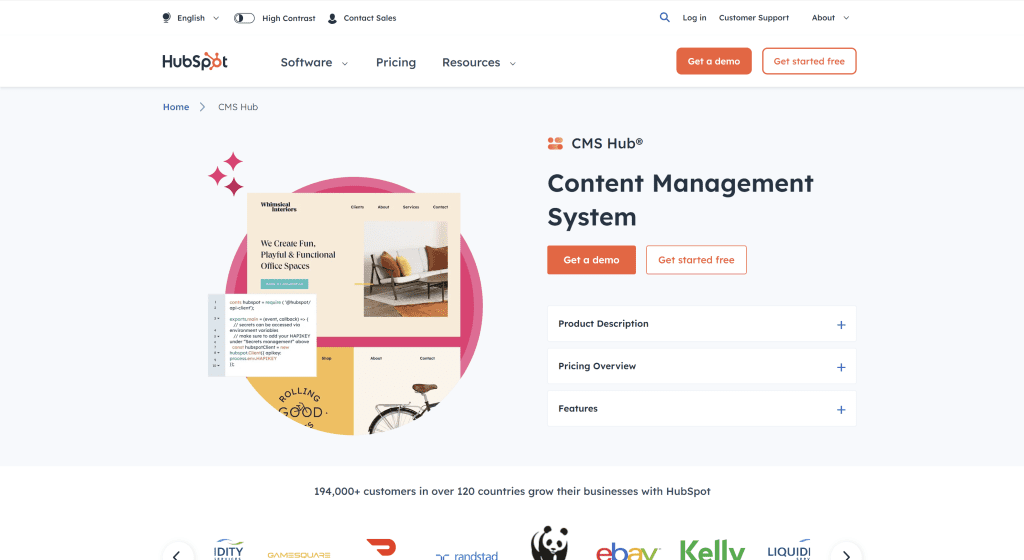
In the realm of Content Management Systems, HubSpot CMS emerges as a formidable option, offering a unique proposition of website creation sans the constant need for updates and edits.
This sophisticated platform not only caters to the needs of beginners with its user-friendly tools but also integrates powerful sales and marketing tools, elevating its status as a comprehensive solution for increasing reach and engagement.
Advantages
- Enhanced Engagement Tools: HubSpot CMS empowers users to boost engagement through integrated email and social media tools, facilitating dynamic and effective outreach strategies.
- Vigilant Security Measures: A dedicated team ensures 24/7 monitoring of the platform, actively checking for potential attacks and conducting regular virus scans, fortifying the digital infrastructure.
Disadvantages
- Limited Plugin and Theme Gallery: HubSpot CMS faces limitations with its gallery for plugins and themes, potentially limiting customization options for users.
- Absence of Direct Technical Support: The platform lacks direct technical support, requiring users to rely on alternative channels for issue resolution.
Ideal for
HubSpot CMS shines as the preferred choice for marketers and those seeking to establish basic websites.
A stellar example is Stellar Recruitment, a website leveraging HubSpot CMS to seamlessly post job vacancies and engage with its audience effectively.
Key Features
- HubSpot CMS introduces Smart Content, allowing users to personalize website content and CTAs based on visitor insights and information.
- A user-friendly drag-and-drop tool simplifies the customization process, offering an intuitive interface for users to tailor their websites effortlessly.
- The platform incorporates an integrated SEO feature, providing recommendations to optimize content, and ensuring enhanced visibility and search engine performance.
In essence, HubSpot CMS is more than a mere content management system; it is a strategic solution that amalgamates simplicity and power.
As we explore its features, it becomes evident that HubSpot CMS caters to a diverse audience, from beginners seeking a hassle-free website creation experience to marketers orchestrating dynamic and engaging online campaigns.
7. Sitecore
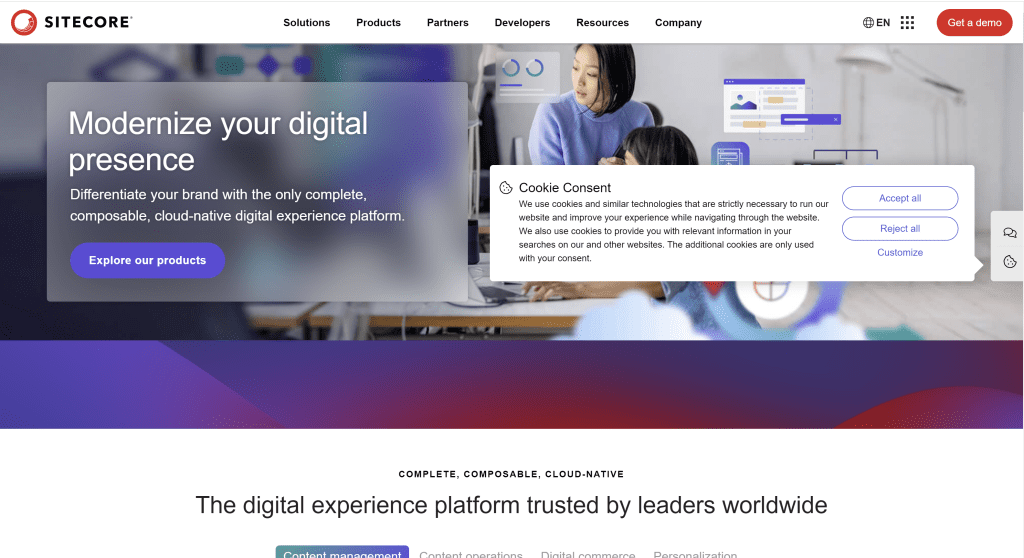
In the realm of enterprise Content Management Systems, Sitecore stands tall as a leading force, crafted on the robust foundation of ASP.NET.
Distinguished from its counterparts, Sitecore, akin to Contentful, excels in facilitating content creation across various digital platforms.
What sets it apart is its unparalleled integration of a multitude of marketing tools, solidifying its status as a flexible CMS tailored for enterprises.
Advantages
- Intuitive User Interface: Sitecore boasts an intuitive and user-friendly interface, streamlining the content management process for users across different skill levels.
- Data Privacy Features: Noteworthy features cater to data privacy, aligning with the latest General Data Protection Regulation (GDPR) standards and ensuring compliance.
Disadvantages
- Elevated Cost: Sitecore’s advanced functionalities come at a higher cost compared to other CMS options, potentially posing budgetary considerations for some organizations.
- Limited Support and Documentation: The platform faces challenges with a perceived lack of support, community engagement, and updated documentation, potentially impacting user experience.
Ideal for
Sitecore emerges as an optimal choice for large-scale organizations with a robust budget.
A prominent illustration is the telecommunications equipment giant Huawei, utilizing Sitecore to showcase detailed product information and updates through high-resolution images on its website.
Key Features
- Sitecore enables users to glean insights into visitor interactions and behaviour, facilitating a personalized understanding of user engagement.
- The platform empowers users to set up marketing campaigns that automatically respond to visitors’ actions on the site, ensuring a dynamic and responsive online presence.
- Sitecore goes beyond basic analytics, allowing the scoring and ranking of visitor interactions, and providing a framework to prioritize and streamline follow-up processes.
In essence, Sitecore is not merely a CMS; it is an enterprise-grade solution that marries technological prowess with marketing acumen.
As we navigate its features, it becomes apparent that Sitecore caters to the intricate needs of large-scale organizations, offering a dynamic and comprehensive platform for content management, analytics, and marketing automation.
Conclusion
In the ever-evolving landscape of the digital sphere, the choice of a Content Management System (CMS) stands as a linchpin for online success.
WordPress: The Reigning Giant of Versatility
Undoubtedly, WordPress remains the undisputed champion in the CMS arena.
Its open-source nature, extensive plugin library, and user-friendly interface continue to make it the go-to choice for beginners and seasoned developers alike.
Whether crafting a simple blog or a complex website, WordPress effortlessly flexes its muscles, setting the gold standard for adaptability and ease of use.
Joomla: Robust Flexibility in the Web Development Symphony
Joomla, with its robust and flexible nature, caters to those seeking a balance between simplicity and advanced functionality.
A powerful contender, Joomla’s multilingual capabilities and efficient management of extensive sub-pages make it an ideal choice for those venturing beyond the basics.
Drupal: Enterprise-Level Dominance and Security
For those navigating the enterprise-level landscape, Drupal stands tall, demonstrating its scalability and advanced security measures.
Its prowess in handling large-scale and complex websites, exemplified by the City of Los Angeles official website, establishes Drupal as the CMS of choice for those seeking a robust foundation for their digital endeavours.
Adobe Commerce: E-Commerce Sophistication and Security
In the world of digital commerce, Adobe Commerce emerges as a powerhouse, formerly known as Magento.
Its robust security features, extensive payment options, and scalability make it the preferred choice for medium to large-scale e-commerce ventures.
PrestaShop: Flexibility Tailored for Smaller Endeavors
PrestaShop, designed with small to medium-sized e-commerce businesses in mind, shines as a flexible and user-friendly solution.
Despite potential limitations in scalability, PrestaShop proves to be a valuable asset for those establishing basic online stores. The website of Harry Fay, a niche jewellery store in the UK, serves as a testament to PrestaShop’s suitability for smaller-scale e-commerce ventures.
HubSpot CMS: Simplifying Complexity for Marketers
HubSpot CMS, with its simplicity and integration of robust marketing tools, caters to both beginners and marketers.
Its features, such as smart content optimization and marketing automation, position it as a strategic choice for those seeking dynamic and personalized online experiences.
Sitecore: Enterprise Pinnacle for Digital Excellence
Lastly, Sitecore stands as the pinnacle of enterprise CMS excellence, integrating powerful marketing tools with an ASP.NET foundation.
While it may come at a higher cost, Sitecore’s personalized data insights, marketing automation capabilities, and engagement analytics make it the choice for large-scale organizations.
Making the Informed Choice for 2024
As we reflect on the collective attributes of these top 7 CMS options, the decision-making process for 2024 becomes more nuanced.
In the digital frontier of 2024 and beyond, the choice is not just about selecting a CMS; it’s about sculpting a digital presence that aligns with the dynamic needs of the online landscape.
Whether the focus is on user-friendliness, e-commerce sophistication, enterprise-level capabilities, or personalized marketing, the top 7 CMS options provide a palette for creators to paint their digital masterpieces.
In conclusion, the journey through the “Top 7 Best Content Management Systems to Use in 2024” serves as a compass.
It guides you through the intricacies of each CMS, empowering you to make informed decisions, and setting the stage for a digital presence that transcends the ordinary.
As we stand on the brink of the digital future, the canvas is yours to paint, and the CMS you choose becomes the brush that shapes your online masterpiece.
If you are looking for a top-class digital marketer, then book a free consultation slot here.
If you find this article useful, why not share it with your friends and business partners, and also leave a nice comment below?
We, at the AppLabx Research Team, strive to bring the latest and most meaningful data, guides, and statistics to your doorstep.
To get access to top-quality guides, click over to the AppLabx Blog.
People also ask
What’s the most popular CMS system currently?
WordPress remains the most popular CMS currently, powering over 43% of all websites. Renowned for its flexibility, user-friendly interface, and extensive plugin ecosystem, it caters to diverse users, from bloggers to enterprises, making it a dominant force in the web development landscape.
How do I choose a content management system CMS?
When choosing a CMS, consider your website’s needs, user-friendliness, scalability, and support. Evaluate features, like customization options and SEO tools. Popular choices include WordPress for versatility, Drupal for scalability, and HubSpot CMS for marketing integration.
What CMS does IKEA use?
As of my last knowledge update in January 2022, IKEA uses the e-commerce platform Magento for its online store. However, technology choices can evolve, so it’s advisable to verify the latest information for the most accurate details regarding IKEA’s current CMS usage.


























